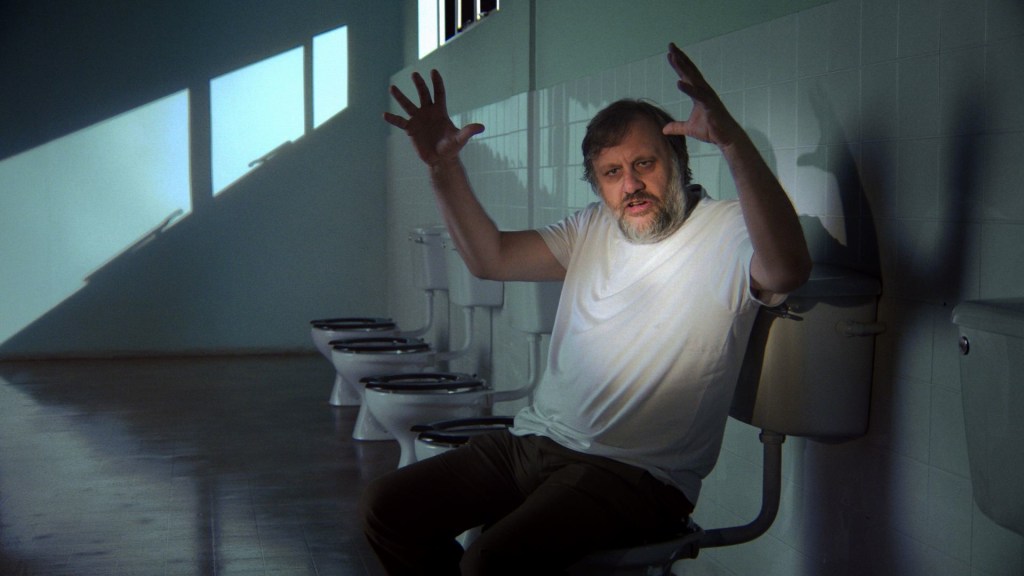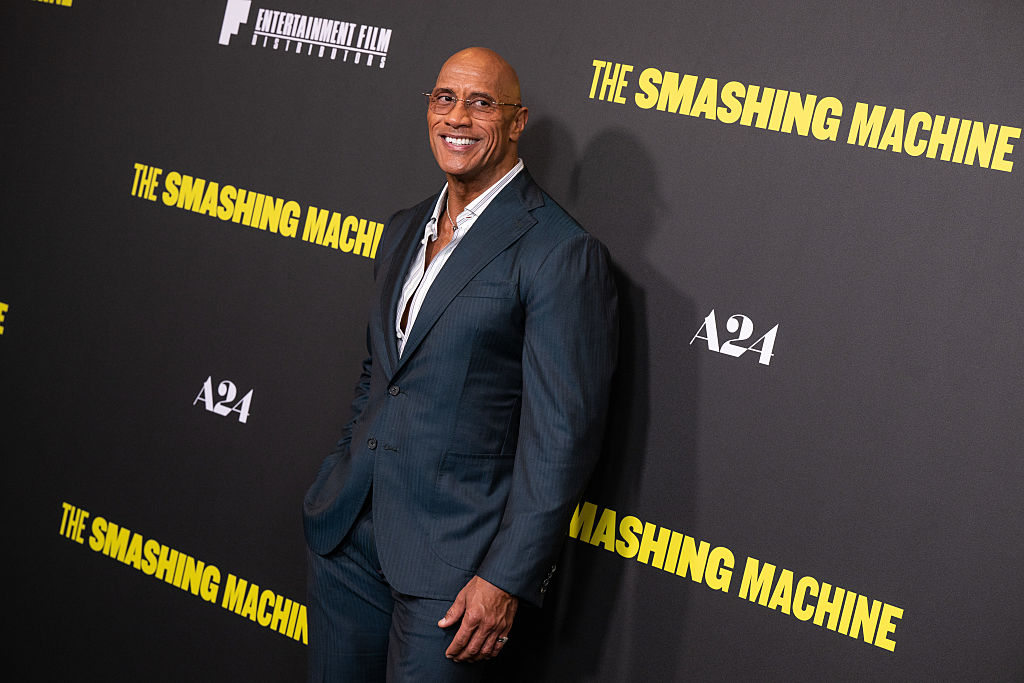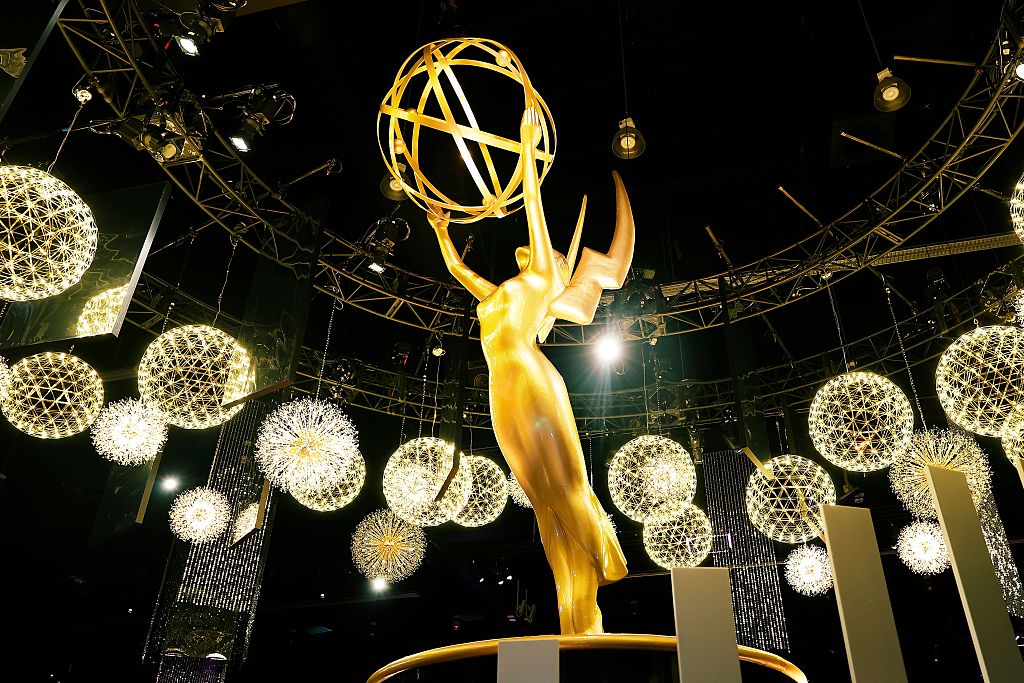Slavoj Žižek is a philosopher and cultural theorist. Rory Sutherland is The Spectator’s Wiki Man. We arranged for them to have a chat. They spoke for more than four hours about identity politics, Elon Musk, Hollywood, free speech and more.
Introductions and ‘luxury beliefs’
Rory Sutherland: I’m recording this on a Meta Portal moving camera, which no one seems to have bought, because I assume nobody wants Mark Zuckerberg spying on them in their living room. I don’t mind though: no one wants to spy on an overweight fifty-seven-year-old advertising executive.
Slavoj Žižek: I know what you mean. Perhaps we should do this interview naked from the waist down! By the way, Rory, I like that your bookshelves are completely empty. You are not walking around going: “I am a big intellectual.”
RS: There’s a more boring reason for that which is that I’ve just had my bookshelves painted. And my daughter insists on keeping some of them empty.
SŽ: Perhaps in these woke times those are the only books of yours that have survived the purge!
RS: Do you know about Rob Henderson’s idea of “luxury beliefs” — how some aspects of denigrating your own culture are a way of signaling your status?
SŽ: Yes, the guy who renounces his identity, who is totally woke, thinks he has authority to criticize others. One of my epiphanies was when I was in Montana years ago with some Native Americans. They hated the term “Native Americans.” They much preferred to be called Indians. “If we are Native Americans,” they said, “what are you? Cultural Americans?” They preferred to be called Indians because it’s a sign of white people’s stupidity. They told me they almost enjoy a good old white racist. They hate how patronizing the white attitude has become. I have some criticisms of Nelson Mandela, but at least he always rejected black identity politics. I was attacked in the US over twenty years ago: a black lady stood up and said: “I am black, I have AIDS and I am a single mother and I don’t agree with you.” She didn’t develop any arguments. Her specific position — AIDS, single mother, black lady v meant I couldn’t respond. That’s a catastrophe.
RS: I suppose that’s an argument of subjective experience, where experience is deemed to trump any general statement that might be made.
SŽ: My counter-argument is that we cannot trust our feelings. There is that wonderful moment in Huck Finn, where Finn helps a black slave escape but feels guilty about it. This is a true example against the authenticity of personal experience. Feelings are never trustworthy.
RS: In your film The Pervert’s Guide to Ideology, you are very clear that ideology is also a limitation on human ability to think clearly and freely.

SŽ: Hundreds of millions can die because of ideology. I have little ideology. To annoy people, I call myself a “conservative communist.” But I am very pro-Ukraine. I fear the Trumpist neo-patriarchal movement too. If they win, there will be a worldwide anti-feminist, anti-modern axis. We have to protect the modern western European liberal legacy. Today everybody hates Europe: Trump hates it, Putin hates, China hates it. I think there is something unique in European liberty. Even the critiques of Europe, be they Marxist or whatever, are deeply rooted in this same European legacy. The European tradition is the only one which contains streaks of its own self-criticism. I’m tired of this anti-Eurocentric trend. When the Taliban took over in Afghanistan, they made a brutal pact with China. That’s the new order that Putin celebrates. Yet at the moment, the US is close to some kind of civil war. For me, a true conservative is something noble. Guys like Trump and Putin: it is an insult to conservatives to call them conservatives. The only true ideology worth living in is in the European tradition.
RS: Do you not think it’s strange that as we educate more and more people, ideology seems to be fostered in universities more than anywhere else? Students emerge not as more open-minded thinkers, but more desperately cleaving to some ideological universal through which to see the world.
SŽ: They need to learn how to ask better questions. For Kant, the public use of reason didn’t live in universities. Reasoning had to happen outside the interests of the state or community. He argued that the reasoning in law faculties and theology faculties were serving institutions. Students shouldn’t be afraid of debate. What happened to Helen Joyce at Cambridge is madness: when she gave her lecture, they established a safe space for those who were too traumatized. Universities are not safe spaces; you should be allowed to question everything. Otherwise, we will have conservatives who say that every sexuality is a threat to civilization, and at the other end of the spectrum, woke types deriding every slight question as “neo-fascism.” I am for all the rights of LGBT+. But it is totally irrational to prohibit the debate on the respective roles of biology, society and sex. And I don’t accept the claim that gender is not biologically determined. Take a woman caught in a man’s body who makes a change: their choice is — in a sense — a free choice but you never make this choice like choosing between a strawberry cake or a cheesecake. This is why LGBT+ ideologists hate psychoanalysis. They see people as totally transparent, who know what he or she wants to be. Freud’s basic lesson is we don’t know what we want to be. Our personality and our sexual identity are all completely inconsistent and contradictory.
RS: We simply can’t read our own preferences. There are large parts of our psychology which are impossible to access.
SŽ: This shouldn’t make trans people fake. On the contrary, it brings out all the serious traumas about being trans. A friend of my wife’s became a she. She had all of these surgical procedures, with her parents’ support. After all this, she finally got confirmation from the city authorities that she is a woman now. And at that point the guilt comes in. She terribly wanted to be something, they went through all of the pain, but when the official confirmation came to her, she was not able to endure it. That is the complexity of life.
RS: We don’t know what we want, and when we get what we think we want, we’re often not very happy. In the British cartoon magazine Viz, there is a character called Morris Day. He’s a sexual pervert, and an absolutely obsessive voyeur. Finally, after spending ages peering through the curtains to try and catch sight of someone’s thigh, he looked back and found he had an extremely attractive wife who was desperate to go to bed with him! All the while he had just been peering out the curtains.
SŽ: Absolutely — a guy with an absolutely beautiful wife always needs more.
RS: Like Hugh Grant!
SŽ: Incidentally, I don’t like Four Weddings and a Funeral. It’s too clichéd. But I like this paradox of love. I am an old-fashioned romantic. You never know when you fall in love. All of a sudden you discover that you are already in love. You don’t make an objective decision, looking for someone that is the most attractive. You don’t have a choice.
Cinema and Hollywood Marxism
RS: You’re a lover of film, and you’re a Marxist philosopher, so let’s talk about The Death of Stalin.
SŽ: I like the dark jokes of that film. People accuse me of making jokes about the gulags and Auschwitz, but you cannot approach them realistically because the horror is so terrible. The only approach you can do is comedy. Studies by my friends confirm this: in Israel, immediately after World War Two, there were even jokes about Auschwitz. They told me: “It’s not that we don’t respect them but it’s too horrible to take it seriously.” Joking is the only appropriate reaction to horror.
RS: It’s like how we signal closeness to people by being abusive to them.
SŽ: Absolutely. For example, with my many black friends in the US, the way they accept me as a friend is instigating really nasty jokes. Dirty language is the only way to signal close proximity, because this means that we are such open friends that even all the dirty talk cannot ruin it. This is what the left has lost. On January 6, my leftist friends were crying. They told me it was wonderful, people penetrating the seat of power, but they said: “We should have been doing it, not the right-wingers.” The right took over the anti-establishment position, they took over jokes and dirty speech, and the left withdrew into this purist, fanatical morality.
RS: A working-class friend of mine who is an academic complains about the total lack of banter in universities.
SŽ: What you find in academia at the moment is literalization. No sense of irony. But we are coming to our topic of: what’s wrong today? I don’t like Hannah Arendt too much, but in her short essay on education she makes a wonderful point. Let’s say you have a ten-year-old kid and he is perplexed by racism, violence and political correctness. In some respects, the honest parent has to admit to being confused as well. But Arendt says that even if this is true, as a parent you cannot say this. Even if you don’t really know what’s best, you have to heroically assume a kind of authority. It’s the same thing with the free will debate. Are we predetermined? Is freedom an illusion? My point is, you cannot act upon this knowledge. If a girl is drowning, and you say: “Well everything is predetermined, so what do I care?” — no! You have to act as if you are responsible.
RS: An organism that didn’t act like they believed in free will probably wouldn’t survive very long. But if we are deterministic beings in a probabilistic universe, do we not need narratives to coordinate action, like religion?
SŽ: Absolutely. I agree with you, but we need different narratives. Are you a simple human being like me, which means you’ve seen Star Wars?
RS: Of course.
SŽ: Do you know what my ideal remake of Star Wars is? What if the Jedis and Yoda are corrupt, and the Emperor and Darth Vader are good advocates of welfare and rational government, who are just annoyed by some reactionaries. This is what we need. Old narratives but with a tiny little bit of change which provides a new perspective on everything.
RS: When I watched Avatar, I found the message so heavy-handed that a part of me wanted to knock down a forest and build a strip mall.

SŽ: Avatar is the worst example of Hollywood Marxism. Do you know my reading of Titanic? There are two crucial things there. First, when Leonardo DiCaprio is freezing in water at the end. Did you notice what Kate Winslet does? She said “I will never let you go” and at that very point she pulls away. Then when they say they love each other, tomorrow will be happy: the ice hits the ship. The way I read it is nature knows better than themselves that if they were to be together, they would have sex for two or three weeks, and then — haha — reality bites. Although I don’t think that was intended by James Cameron.
RS: I’m so glad you are a mischievous film critic. When I was fourteen it never occurred to me that Brave New World was a dystopia. It seemed absolutely fantastic! Lots of new technology and interesting things. I also wasn’t really sure that Apocalypse Now was an anti-war film.
SŽ: When I first saw Hitchcock’s Vertigo, for ten years afterwards I thought it was a movie with a happy ending. I hadn’t seen the final minute! I love movies where the only way to read them is to play with three or four endings.
Futurism & travel
RS: Are you uncomfortable, as I am, with the assumption that futurism means ever more urbanism? In the past few years there have been thousands of conferences on smart cities, mass transit, high-rise living, and yet if you look at the evidence people actually don’t like it very much. You would think that the internet would make greater physical agglomeration less necessary. Yet over the past thirty years it’s driven insane property prices, the over-concentration of people in five or six megacities in any given country, but it is not necessarily lying very well with human wellbeing or happiness.
SŽ: When I visited Japan, I saw that they have reserved around 30 percent of the land where you pack as many people as possible. It’s crazily overcrowded and then you keep the remaining 70 percent pristine.
RS: I traveled from Kyoto to Tokyo and only at one point did I ever see anything that approximated the countryside and that was on a two-hour journey on a bullet train. The strangest thing surely is that the very rich — given that space is one of the greatest luxuries — are so keen on crowding themselves into enormous cities. You could argue that that’s because you need the presence of other super-rich people to show off. But there’s no point in showing off to people who are 10 percent as wealthy as you, you need to show off to people who are 95 percent as wealthy as you.
SŽ: The international aristocracy like big cities like London because they are international and no longer British. But lots of these cities are so horrible. It always surprises me, for example, in New York, how ugly an experience JFK airport is. The taxi lobbies and other lobbies prevent anything that would seem to be extremely simple to do — a clean, direct, fast train subway connection from Manhattan.
RS: It’s when I’m in New York that I feel most European. Every time I land at JFK, I think: “You’re the richest city in the goddamn world, build a bloody train to the airport.”
SŽ: I am a strange guy when it comes to city traveling. I like the intellectual challenge of not visiting the tourist points. To just have the capacity of “I could have done it but no thanks, I will not do it.”
RS: Socrates used to go to the market in Athens and reassure himself by looking at the number of things he didn’t need to buy.
SŽ: I totally agree. This is why I cannot take big museums seriously where there is a crowd of tourists. If you want to see a famous painting, you need some books and explanations of it. When I go to the British Museum with somebody, or to the National Gallery, I have just two stops: the café and the museum store. I love them. They are a wonderful way of playing a game with culture. For example, when I was at the Edvard Munch museum in Bergen, I bought two cult objects: one is an inflatable statue of the figure from “The Scream.”
RS: I’m going on eBay as soon as this call ends!
SŽ: The other one was a pillow with “The Scream” figure on it and of course, when you put your head on it, it screams.
RS: Absolutely fantastic!
SŽ: Isn’t it wonderful?
RS: There was an advertising campaign back in the early 1990s for the Victoria & Albert Museum which had the line: “An ace café with a rather nice museum attached.” That’s entirely in line with your thoughts. I watch a lot of YouTube and my YouTube viewing is sort of 20 percent intellectual and 80 percent cats falling off things. It occurred to me that actually the combination of high culture and very low culture is probably our natural state. In sixteenth- or seventeenth-century England, people said: “Do you feel like going to Shakespeare tonight?” And you would reply: “No, I’ve already seen King Lear but there’s some bear baiting going on 100 yards down the river.”
SŽ: Years ago in Germany I met the movie director Alexander Kluge. I asked him: “When you were with the philosopher Theodor Adorno, did you discover that Adorno had some private guilty pleasures?” I knew he was an extreme elitist in art, but did he privately listen to pop music or watch Marx Brothers movies? He said no, he was exactly the same: elitist. That’s a shame. It’s absolutely crucial to keep the link between the highest of the highest and the lowest of the lowest.
Cancel culture and Elon Musk
RS: The fact that comedians tend to dislike cancel culture should be a warning signal. It is ridiculous that you have the language of comedians being policed by academics.
SŽ: To put it in the old Stalinist terms, you think you know better than other people what is really good for them when they are hurt.
RS: By the way, it is reasonable to separate out the intention of the woke movement from its worst manifestations. Some people on the right get very upset by trigger warnings, but they seem to me eminently sensible. If there is some scene in a film which could be immensely distressing to 5 percent of the population, warning them in advance seems to me to be entirely uncontroversial, well-intentioned and likely to be basically kind. I don’t have any particular aversion to people stating their preferred gender pronouns so long as they don’t demand it of everybody else. It seems a perfectly harmless activity. But to assume for yourself the ability to impute the speaker’s original intent seems to me extremely dangerous.
SŽ: In the last decades of the communist Eastern Europe: OK, it was a little bit dangerous to be spreading political jokes against those in power, but we hear now from some documents, communists were not always stupid. They said it was better to allow people to tell jokes against us than to explode directly in a protest.
RS: Do you think Elon Musk’s takeover of Twitter might be a good thing for free speech?
SŽ: What shocked me is when he bought Twitter he said — in his typical megalomaniac way – that the fate of our western democracy hinges on this. Isn’t it horrible, the very idea that the fate of our democracy or public space hinges on one rich guy buying a certain media company? The danger is no longer state control but potentially worse private control.
🚀💫♥️ Yesss!!! ♥️💫🚀 pic.twitter.com/0T9HzUHuh6
— Elon Musk (@elonmusk) April 25, 2022
RS: I think to be honest the terrible mistake Twitter made was barring Donald Trump, which was not really a transparent decision. The idea was yes, he had incited violence against others. That’s open to debate. You could argue he had plausible deniability. At the time he was the elected representative of 333 million people and barring him seemed to me to be an extraordinarily dubious decision. But how about the idea that Twitter users and contributors have some stake in the profits of Twitter, a perfectly reasonable thing to debate? At the moment you have large digital monopolies making decisions entirely on algorithmic grounds, which means that the decision doesn’t even have to be explained.
SŽ: That’s the horror today. The systems, which have a political, social, economic weight, are sold to us as simple automatic algorithms or purely expert knowledge. My idea is a social network that doesn’t limit the space of your private initiatives but sustains it and keeps it open. Are you in London, Rory?
RS: I am just outside London in Kent.
SŽ: It would be nice to meet and go out on the town in London.
RS: What food do you like when you come here?
SŽ: I like the lowest industrial English food like pork pies, Scotch eggs and so on. As for drinking, I worry about my health so I prefer… Did you hear about an ancient American health drink called Coca-Cola? Originally it was sold in pharmacists.
RS: Beautifully admired by Warhol, by the way, where he says all the Cokes are the same and all the Cokes are good. The president of the United States can’t get a better Coke than the bum on the corner of the street.
SŽ: Absolutely.
RS: It is the ultimate egalitarian drink.
SŽ: The idea is that if you drink Diet Coke you get other cancerous stuff, but you have to risk something to be alive! Thanks very much, bye-bye.
RS: Absolute pleasure, thanks very much.
This article was originally published in The Spectator’s UK magazine. Subscribe to the World edition here.

























